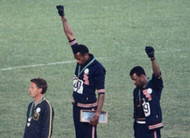The Black Power Olympics: Two Athletes who Stunned the World
Posted by Pete on Oct 16th 2021
It's one of the most famous photos in history - but what's the story behind the Black Power protest at the 1968 Olympics?
The Modern Olympics have never been just about sport.
Despite official efforts to keep them ‘non-political’ (whatever that means), the Olympics have always been a place of struggle over issues of freedom, equality, and international solidarity.
In 1936, a collection of working-class groups boycotted the Nazi Olympics in Berlin and held their own 'People's Olympiad' in Republican Spain.
But today, we’re commemorating the podium protest of Tommie Smith and John Carlos at the Mexico City Olympics of 1968.
Malcolm X was assassinated three years before the Mexico Olympics, but his legacy inspired a burgeoning Black Power movement.
The Mexico Games took place against a backdrop of black liberation struggle in the US.
Martin Luther King had just been murdered at a motel in Memphis, but the civil rights movement was ongoing, and the memory of Malcolm X was helping to fuel a new Black Power movement across the States.
African Americans continued to be brutalized by police forces and white vigilantes, as well as on the battlefields of Vietnam. Muhammad Ali had been stripped of his heavyweight title for refusing to go to Southeast Asia.
There were growing calls for black athletes to boycott the 1968 Olympics. Why compete for a country which abused you like this?
But the track & field athletes, Tommie Smith and John Carlos, decided to go to Mexico – not as an alternative to protest but as a commitment to it.
Like Muhammad Ali, Smith and Carlos used their platform to fight for change.
View our Muhammad Ali tea towel
Smith, from Texas, and Carlos, from Harlem, were both formidable sprinters. They won gold and bronze in the 200 meters – at 19.83 seconds, Tommie Smith broke the World Record.
By their skill and tenacity, these black athletes had won a moment in the global spotlight. And they were about to use it for something more than celebrating a medal.
As they approached the podium on the morning of 16 October, Smith was wearing a black scarf to symbolize black pride.
John Carlos had his tracksuit top unzipped, to show solidarity with all blue-collar workers in the US. He also wore a necklace of beads,
‘for those individuals that were lynched, or killed and that no-one said a prayer for, that were hung and tarred. It was for those thrown off the side of the boats in the Middle Passage.’
With the Australian silver-medalist, Peter Norman, who was a supporter of their protest, Smith and Carlos also wore badges from the Olympic Project for Human Rights (OPHR).
Then, as the US Anthem played to mark Tommie Smith’s gold medal, both Americans lowered their heads and raised a clenched fist of protest in the Black Power salute.

Smith and Carlos on the podium, holding up their fists in a Black Power salute.
Smith later explained the protest:
‘If I win, I am American, not a black American. But if I did something bad, then they would say I am a Negro. We are black and we are proud of being black. Black America will understand what we did tonight.’
White America, meanwhile, was furious.
Take Avery Brundage, an infamous Nazi-sympathizer who by 1968 had been elevated to President of the International Olympic Committee.
When Jewish Americans had pushed for a US boycott of the Berlin Olympics in 1936, Brundage had been the one to stop them.
In 1968, after Smith and Carlos’ Black Power protest, he demanded their expulsion from the US Olympic Team and the Olympic Village in Mexico City.
Brundage, who had not objected to German athletes performing the Hitler salute in 1936, now claimed political gestures had no place in the Games.
When the US Committee initially refused to drop Smith and Carlos, Brundage threatened to expel the whole Track & Field team, which did the trick.
But while Brundage has faded into the past as a contemptible nobody, Tommie Smith and John Carlos will never be forgotten.
Their act of protest in Mexico joined a tradition of black radicalism in US sport running from Paul Robeson to Colin Kaepernick.
For as long as white supremacy has existed in America, black athletes have used their platform to demand racial justice. We salute them.



